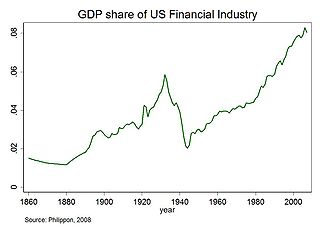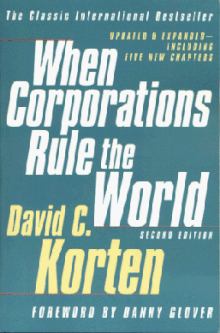
Globalization, or globalisation, is the process of interaction and integration among people, companies, and governments worldwide. The term globalization first appeared in the early 20th century, developed its current meaning sometime in the second half of the 20th century, and came into popular use in the 1990s to describe the unprecedented international connectivity of the post-Cold War world. Its origins can be traced back to 18th and 19th centuries due to advances in transportation and communications technology. This increase in global interactions has caused a growth in international trade and the exchange of ideas, beliefs, and culture. Globalization is primarily an economic process of interaction and integration that is associated with social and cultural aspects. However, disputes and international diplomacy are also large parts of the history of globalization, and of modern globalization.
Neoliberalism, also neo-liberalism, is a term used to signify the late-20th century political reappearance of 19th-century ideas associated with free-market capitalism, which had fallen into decline following the Second World War. The term has multiple, competing definitions, and is often used pejoratively. In scholarly use, the term is frequently undefined or used to characterize a vast variety of phenomena.

David C. Korten is an American author, former professor of the Harvard Business School, political activist, prominent critic of corporate globalization, and "by training and inclination a student of psychology and behavioral systems". His best-known publication is When Corporations Rule the World. In 2011, he was named an Utne Reader visionary.
Race to the bottom is a socio-economic phrase to describe either government deregulation of the business environment or reduction in corporate tax rates, in order to attract or retain economic activity in their jurisdictions. While this phenomenon can happen between countries as a result of globalization and free trade, it also can occur within individual countries between their sub-jurisdictions. It may occur when competition increases between geographic areas over a particular sector of trade and production. The effect and intent of these actions is to lower labor rates, cost of business, or other factors over which governments can exert control.
A state-owned enterprise (SOE) is a government entity which is established or nationalised by a national or provincial government, by an executive order or an act of legislation, in order to earn profit for the government, control monopoly of the private sector entities, provide products and services to citizens at a lower price, implement government policies, and/or to deliver products & services to the remote locations of the country. The national government or provincial government has majority ownership over these state owned enterprises. These state owned enterprises are also known as public sector undertakings in some countries. Defining characteristics of SOEs are their distinct legal form and possession of financial goals and developmental objectives, SOEs are government entities established to pursue financial objectives and developmental goals.
A multinational corporation (MNC) – also called a multinational enterprise (MNE), transnational enterprise (TNE), transnational corporation (TNC), international corporation, or stateless corporation, with subtle but contrasting senses – is a corporate organization that owns and controls the production of goods or services in at least one country other than its home country. Control is considered an important aspect of an MNC to distinguish it from international portfolio investment organizations, such as some international mutual funds that invest in corporations abroad simply to diversify financial risks. Black's Law Dictionary suggests that a company or group should be considered a multinational corporation "if it derives 25% or more of its revenue from out-of-home-country operations".
In economics, internationalization or internationalisation is the process of increasing involvement of enterprises in international markets, although there is no agreed definition of internationalization. Internationalization is a crucial strategy not only for companies that seek horizontal integration globally but also for countries that addresses the sustainability of its development in different manufacturing as well as service sectors especially in higher education which is a very important context that needs internationalization to bridge the gap between different cultures and countries. There are several internationalization theories which try to explain why there are international activities.
Corporatization is the process of transforming and restructuring state assets, government agencies, public organizations, or municipal organizations into corporations. It involves the adoption and application of business management practices and the separation of ownership from management through the creation of a joint-stock or shareholding structure for the organization. The result of corporatization is the creation of state-owned corporations where the government retains a majority ownership of the corporation's stock. Corporatization is undertaken to improve efficiency of an organization, to commercialize its operations, to introduce corporate and business management techniques to public functions, or as a precursor to partial or full privatization.
Robin Eric Hahnel is an American economist and professor emeritus of economics at American University. He was a professor at American University for many years and traveled extensively advising on economic matters all over the world. He is best known for his work on participatory economics with Z Magazine editor Michael Albert.
Private sector development (PSD) is a term in the international development industry to refer to a range of strategies for promoting economic growth and reducing poverty in developing countries by building private enterprises. This could be through working with firms directly, with membership organisations to represent them, or through a range of areas of policy and regulation to promote functioning, competitive markets.
International business refers to the trade of Goods and service goods, services, technology, capital and/or knowledge across national borders and at a global or transnational scale.
In economics, a market is a composition of systems, institutions, procedures, social relations or infrastructures whereby parties engage in exchange. While parties may exchange goods and services by barter, most markets rely on sellers offering their goods or services to buyers in exchange for money. It can be said that a market is the process by which the prices of goods and services are established. Markets facilitate trade and enable the distribution and allocation of resources in a society. Markets allow any tradeable item to be evaluated and priced. A market emerges more or less spontaneously or may be constructed deliberately by human interaction in order to enable the exchange of rights of services and goods. Markets generally supplant gift economies and are often held in place through rules and customs, such as a booth fee, competitive pricing, and source of goods for sale.
Developmental state, or hard state, is a term used by international political economy scholars to refer to the phenomenon of state-led macroeconomic planning in East Asia in the late 20th century. In this model of capitalism, the state has more independent, or autonomous, political power, as well as more control over the economy. A developmental state is characterized by having strong state intervention, as well as extensive regulation and planning. The term has subsequently been used to describe countries outside East Asia that satisfy the criteria of a developmental state. The developmental state is sometimes contrasted with a predatory state or weak state.

Financialization is a term sometimes used to describe the development of financial capitalism during the period from 1980 to present, in which debt-to-equity ratios increased and financial services accounted for an increasing share of national income relative to other sectors.

Grandhi Mallikarjuna Rao is a mechanical engineer, billionaire industrialist, the founder chairman of GMR Group, a global infrastructure developer and operator based in India. Started in 1978, GMR Group is now present in 7 countries, active in energy, highways, large urban development and airports sectors, known for building and operating world class national assets.
National champions are corporations which are technically private businesses but due to governmental policy are ceded a dominant position in a national economy. In this system, these large organizations are expected not only to seek profit but also to "advance the interests of the nation"; the government sets policies which favor these organizations. The policy is practiced by many governments, in some sectors more than others, but by giving an unfair advantage against market competition, the policy promotes economic nationalism domestically and global pre-eminence abroad contrary to the free market. The policy also deters or prevents venture capitalism.
In political ecology and environmental policy, climate governance is the diplomacy, mechanisms and response measures "aimed at steering social systems towards preventing, mitigating or adapting to the risks posed by climate change". A definitive interpretation is complicated by the wide range of political and social science traditions that are engaged in conceiving and analysing climate governance at different levels and across different arenas. In academia, climate governance has become the concern of geographers, anthropologists, economists and business studies scholars.
Economic globalization is one of the three main dimensions of globalization commonly found in academic literature, with the two others being political globalization and cultural globalization, as well as the general term of globalization. Economic globalization refers to the widespread international movement of goods, capital, services, technology and information. It is the increasing economic integration and interdependence of national, regional, and local economies across the world through an intensification of cross-border movement of goods, services, technologies and capital. Economic globalization primarily comprises the globalization of production, finance, markets, technology, organizational regimes, institutions, corporations, and people.
Economic democracy is a socioeconomic philosophy that proposes to shift ownership and decision-making power from corporate shareholders and corporate managers to a larger group of public stakeholders that includes workers, consumers, suppliers, communities and the broader public. No single definition or approach encompasses economic democracy, but most proponents claim that modern property relations externalize costs, subordinate the general well-being to private profit and deny the polity a democratic voice in economic policy decisions. In addition to these moral concerns, economic democracy makes practical claims, such as that it can compensate for capitalism's inherent effective demand gap.

Alter-globalization is a social movement whose proponents support global cooperation and interaction, but oppose what they describe as the negative effects of economic globalization, considering it to often work to the detriment of, or to not adequately promote, human values such as environmental and climate protection, economic justice, labor protection, protection of indigenous cultures, peace and civil liberties. The movement is related to the global justice movement.




